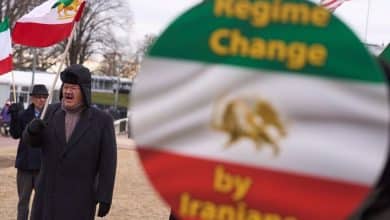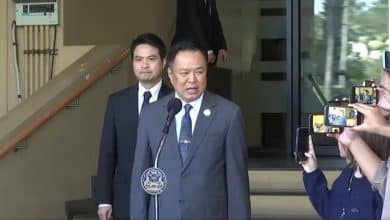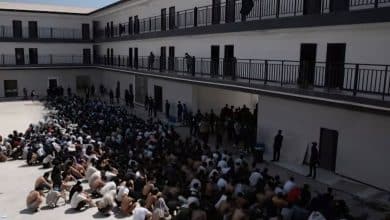World News
World news, global politics, business, technology, and culture—stay updated with breaking stories, international trends, and major events. Get the latest from The Thaiger, your trusted source for global news.
-

Brazilian suspect admits killing Thai woman in Japan apartment
A Brazilian man confessed to killing a Thai woman by strangling her at his apartment in Tsu City, Mie prefecture, Japan. The Thai woman was identified as 47 year old Supaluck Narusue, who lived and worked part time at a factory in Okazaki city in Aichi prefecture. She did not return home after telling her family she would meet a…
-

Suvarnabhumi Airport apologises after complaint about rude staff and poor service
Suvarnabhumi International Airport issued an apology after Thai travel bloggers and other passengers complained about rude behaviour and poor customer service at a security screening checkpoint. Several travel bloggers posted in recent days about negative experiences at security and passenger screening points at Thai airports, particularly Suvarnabhumi. Many said officers spoke to passengers without manners and showed little service-mindedness. The…
-

New passenger screening procedures eyed for Thai airports
Airport workers in Thailand reportedly raised concerns after the Civil Aviation Authority of Thailand (CAAT) planned to change passenger screening procedures, moving away from handheld metal detectors to manual searches and searches of suspicious bags without prior notice to passengers. DailyNews reported today, February 23, that CAAT introduced new rules for screening passengers and their belongings. However, the CAAT had…
-

Sydney hammer attack leaves South Korean man and 2 Thais injured
A South Korean man and two Thai nationals were injured in a hammer attack in Sydney, Australia, on February 18, after they were assaulted by three people while walking home from a party. The incident occurred at about 3am as the 23 year old South Korean man, identified as Dave, walked with two Thai friends aged 28 and 29. Reports…
-

Russian man jumps from plane after landing at Bangkok airport
A foreign man in underwear, believed to be a Russian national, caused chaos and jumped off an airplane from an emergency exit door shortly after it landed at Don Mueang International Airport in Bangkok, following a journey from Vietnam. A Thai woman who was travelling on the same flight shared footage of the incident on her TikTok account, @piapornchamsri, on…
-

AOT to raise passenger service charge for international flights from May
Airports of Thailand (AOT) confirmed plans to increase the passenger service charge (PSC) for international departures in May this year. While the increase will largely affect foreign travellers, AOT insisted that it will not reduce the number of international visitors to Thailand. The chief executive officer of AOT, Paweena Jariyathitipong, told local media that the PSC for passengers departing on international…
-

AirAsia leaves 23 passengers behind on bus, cites miscommunication
AirAsia issued an apology following a coordination issue that left 23 passengers on a shuttle bus during boarding for a domestic flight from Bangkok to Hat Yai. The incident occurred on January 17 on Flight FD3116, which was scheduled to depart Don Mueang International Airport at 7.10am. A passenger later described the situation in a Facebook post published on January…
-

Cobra Gold 2026 brings over 8,000 troops to Thailand
Thailand is set to host the 45th annual Cobra Gold military exercise from February 24 to March 6, bringing together more than 8,000 personnel from 30 countries in one of the region’s largest joint defence operations. The multinational exercise, co-hosted by the Royal Thai Armed Forces and the United States Indo-Pacific Command (US PACOM), will take place across several locations…
-

Thai foreign minister seeks clarity on US immigrant visa halt
Thailand’s foreign minister met with a top United States diplomat in Bangkok today, January 15, to seek clarification over Washington’s recent decision to suspend immigrant visa processing for 75 countries, including Thailand. Foreign Affairs Minister Sihasak Phuangketkeow said he had summoned the US chargé d’affaires in Thailand to discuss the move, after Thailand appeared on a newly released list of…
-

Thailand among 75 nations hit by US visa processing suspension
The United States will temporarily suspend immigrant visa processing for Thailand and 74 other countries, effective January 21, 2026, as part of tighter immigration screening under its America First policy, the US State Department announced on January 14. The immigration visa freeze targets applicants from countries where migrants are said to disproportionately rely on public assistance after settling in the…
-

What’s happening in Iran? How hunger protests turned into a fight to topple the Islamic Republic.
Iran is currently cut off from the outside world. The government has severed internet and telephone lines nationwide, hoping to blind and deafen the international community to the brutality of its crackdown. Yet, the screams of frustration from the streets echo far beyond the digital blackout. This nationwide uprising is a clear signal: the 40-year-old theocratic regime is facing its…
-

Thai students claim top prize at Harbin snow sculpture contest
Thai vocational students from Bangkok and Chiang Rai won the 2026 International Collegiate Snow Sculpture Contest in Harbin, China, with a sculpture inspired by the Siamese fighting fish and goddess of water. The annual snow sculpture contest, organised by Harbin Engineering University, returned for its 18th edition this year. The competition was held from January 4 to 7 in Harbin,…
-

Cambodia accused of covering up Angkor Wat YouTuber assault
A travel YouTuber, known as The Country Collectors, who was assaulted at Cambodia’s Angkor Wat, posted a statement yesterday, January 7, that the Cambodian government has now attempted to cover up the story. In his statement posted on social media, the YouTuber said the APSARA National Authority, responsible for overseeing Angkor Archaeological Park, released an official response to the story.…
-

Missing Chinese influencer found injured and begging in Cambodia
A Chinese influencer was found injured and begging for money in Cambodia after losing contact with her family since December 26 last year. Images of a Chinese woman carrying an X-ray film circulated widely on Cambodian and Thai social media recently. The woman was seen wearing a white mini dress with a tweed blazer, glasses, and a headband worn across…
-

New fraud center compound found in Cambodia, 50 km from Poipet
Authorities have identified a new large-scale scam compound operating in Cambodia, around 50 kilometres from Poipet, raising fresh concerns over the regional spread of online fraud networks targeting victims worldwide. The Anti-Online Fraud Center, known as ACSC, confirmed the discovery on January 5, 2026, warning that criminal syndicates are rapidly relocating and expanding after recent coordinated crackdowns in Thailand, China,…
-

Royal Thai Navy detains 67 Cambodian migrants attempting illegal border crossing into Thailand
The Royal Thai Navy has detained 67 Cambodian migrant workers who attempted to illegally cross the Thai border in Chanthaburi province, authorities confirmed on January 3, 2026. The group included men, women, and children who officials said were fleeing severe economic hardship, unemployment, and food insecurity in their home communities. Rear Admiral Parach Rattanachaiyapan, spokesperson for the Royal Thai Navy,…
-

Explosion at Swiss Bar in Crans-Montana Kills at Least 40
Swiss Ski Resort Tragedy Explosion at Crans-Montana Bar Kills ‘Dozens,’ Italy Reports 40 Dead CRANS-MONTANA — A devastating explosion followed by a massive fire at a popular bar in the renowned Swiss ski resort of Crans-Montana has resulted in a “mass casualty” event, sending shockwaves across Europe. Swiss police confirmed “dozens” of fatalities, while Italian authorities report the death toll…
-

“I Paid For It!” Chinese guest fumes after being stopped from packing buffet food
Mother and Son Cause Scene at Hotel Buffet Over ‘No Takeaway’ Ban, Threaten Staff SUZHOU — A heated altercation erupted at a hotel in Suzhou, Jiangsu Province, after a mother and son were stopped from packing food from the breakfast buffet to take home. it escalated into a physical confrontation after the guests refused to comply with hotel regulations. Witnesses…
-

Body of Missing 19-Year-Old Texas Teen Found After Christmas Eve Disappearance
Tragic End: Body of Missing 19-Year-Old Texas Teen Found After Christmas Eve Disappearance SAN ANTONIO, TEXAS — The desperate search for Camila Mendoza Olmos, 19, who vanished on Christmas Eve, has concluded with a heartbreaking discovery. Bexar County Sheriff Javier Salazar confirmed on Tuesday afternoon that search teams located a lifeless body in a field near the residential area where…
-

Trump says Thailand-Cambodia peace achieved with ‘very little assistance’ from UN
US President Donald Trump said yesterday, December 28, that Thailand and Cambodia returned to peace following a recent ceasefire agreement, claiming the outcome was achieved with “very little assistance” from the United Nations (UN). Trump made the statement on his social media platform, Truth Social, shortly after the ceasefire agreement between Thailand and Cambodia was reached on Saturday, December 27. In…
-

Thailand agrees to ceasefire, rejects pre-clash position return
Thailand says it is prepared to enter a short ceasefire with Cambodia but will not accept any deal that requires Thai forces to retreat from areas they have secured during the latest border clashes. Prime Minister Anutin Charnvirakul said the National Security Council has approved a 72-hour ceasefire proposal and authorized Defense Minister Nattaphon Narkphanit to represent Thailand at talks…
-

Thai army reports heavy clashes in Sisaket as border tensions stay high
The 2nd Army Region has released its latest summary of fighting along the Thai-Cambodian border, saying tensions remained high on December 26, particularly in Sisaket province, where heavy exchanges of fire were reported throughout the day. According to the army, clashes were concentrated across multiple points along the border, but Thai forces retained control of all strategic areas. In Ubon…
-

Cambodian men charged over attack on Thais in South Korea
Four Cambodian men were arrested today, December 26, and charged in South Korea after allegedly attacking two Thai nationals with glass bottles on the morning of December 7 in Yeongam county, South Jeolla province. The assault took place on the morning of December 7 in the Samho-eup area of Yeongam county, South Jeolla province, when a group of four Cambodian…
-

South Korean celebrity Hwang Hana returns home and surrenders to drug charges
A South Korean celebrity, Hwang Hana, who was wanted under an Interpol Red Notice, returned to her home country yesterday, December 24, and surrendered to authorities to face legal proceedings over drug-related offences. The 37 year old celebrity is widely known as the granddaughter of the founder of Namyang Dairy Products, one of South Korea’s major food companies. She is…
-

Malaysian woman allegedly lives double life after secret marriage in Songkhla
A Malaysian woman called on religious authorities to take action after discovering that her brother’s wife had secretly married another man in Songkhla province of Thailand and lived a double life for more than a year. The woman, identified as Ekin Derahim, shared details of the alleged affair on her Facebook account on December 11. In her post, she also…
-

Trump reclassifies cannabis in major US drug policy shift
US President Donald Trump has ordered a change to federal drug regulations, signing an executive order to downgrade cannabis from a Schedule I to a Schedule III narcotic, the most significant shift in American drug policy in decades. The reclassification would place cannabis in the same category as ketamine, anabolic steroids, and Tylenol with codeine, substances considered to have legitimate…
-

Malaysia thanks Thailand for role in repatriation of online scam victims
Malaysia has formally thanked Thailand for its coordination and assistance in the successful repatriation of 31 Malaysian nationals who were victims of an online job scam in Myawaddy, Myanmar. According to reports by Asian News Network and The Straits Times, Malaysia’s Ministry of Foreign Affairs confirmed that all 31 victims were safely repatriated on the evening of December 20 and…
-

ASEAN steps in as Thailand-Cambodia border war tests regional unity
The Association of Southeast Asian Nations (ASEAN) foreign ministers will meet in Malaysia on Monday in a renewed attempt to stop escalating violence along the Thailand-Cambodia border, as clashes spread across disputed territory and humanitarian pressures intensify. The talks in Kuala Lumpur come after weeks of fighting that have left at least 40 people dead and forced more than 500,000…
-

Thai and Cambodian Airport Passenger Numbers Drop Despite Open Flights
Tensions between Thailand and Cambodia have spilled into the aviation sector, with airport authorities in both countries trading accusations even as flight connections remain open and operational. At the center of the dispute are allegations from Cambodian officials that passengers transiting through Bangkok face repeated delays and baggage problems, claims Thai authorities strongly deny. This week, Airports of Thailand rejected…
Broke? Find employment in Southeast Asia with JobCute Thailand and SmartJob Indonesia. Rich? Invest in real estate across Asia with FazWaz Property Group or get out on a yacht anywhere with Boatcrowd. Even book medical procedures worldwide with MyMediTravel, all powered by DB Ventures.





























